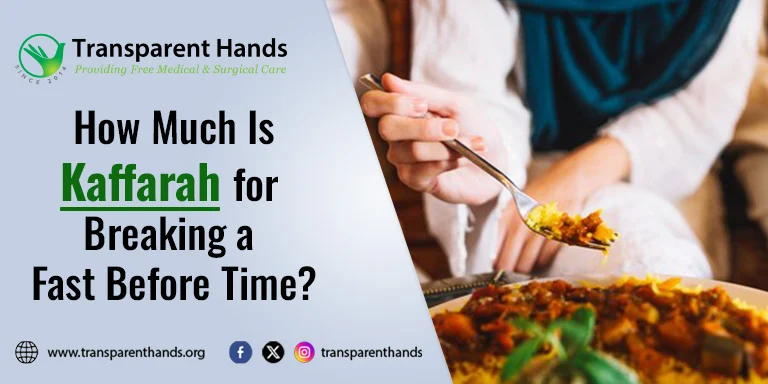How Much Is Kaffarah for Breaking a Fast Before Time?

Fasting is the fourth pillar of Islam and one of the most important obligations for Muslims. All sane and healthy adult Muslims must fast during Ramadan. During this period, the believers abstain from food, drinks, physical intimacy, and all kinds of immoral activities. This practice aims to develop taqwa, the quality of being aware of Allah’s (SWT) presence. While fasting, believers demonstrate their willingness to obey Allah’s (SWT) word and practice the patience, steadfastness, and self-discipline required to become better Muslims. Fasting promotes self-discipline and helps believers contemplate and meditate.
However, human beings don’t always act reasonably and smartly. In this article, we will explore human vulnerabilities to falter during fasting. We will also see how much is the Kaffarah for breaking a fast before time during Ramadan. Note that Kaffarah only applies to breaking a fast during Ramadan. If someone breaks a fast that isn’t kept during Ramadan, they are only liable to pay a Qada for it.
The Weakness in Humans and the Challenges of Fasting
Although fasting can be physically and behaviorally challenging, Allah (SWT) grants the will and strength to those believers who strive for it. According to the Quran:
“And will provide for him from where he does not expect. And whoever relies upon Allah – then He is sufficient for him. Indeed, Allah will accomplish His purpose. Allah has already set for everything a [decreed] extent. (Surat Aţ-Ţalāq, 65:3)”
While the Quran sets up the expectations for human beings, it also informs us about our weaknesses.
“And Allah wants to lighten for you [your difficulties]; and mankind was created weak.” (Surat An-Nisā, 4:28)
We can be weak and hasty. Even those who intend to fast with the sincerest intentions may go astray. Temptation has led many astray, and we must take refuge from such transgressions. While breaking a fast before time is a grievous sin, Allah’s (SWT) mercy knows no boundaries.
The Messenger of Allah (ﷺ) said: “Every son of Adam commits sin, and the best of those who commit sin are those who repent.’ (Sunan Ibn Majah, 4251)
Pay Your Kaffarah Online
What is Kaffarah and Where Does It Apply?
Kaffarah is derived from ‘Kafar,’ which means covering, concealing, or hiding. Kaffarah is a penance for intentionally breaking a fast before time during Ramadan. Note that Kaffarah only relates to situations that involve the intentional breaking of a fast without any valid reasons, during Ramadan. If someone has to break a fast due to a worsening medical condition, they will only have to make up for the missed fast later.
However, when a person intentionally breaks a fast, they have to pay Kaffarah, which is equal to fasting consecutively for 60 days or feeding 60 poor Muslims, twice a day. Another option for Kaffarah is to pay 60 deserving Muslims money equal to Sadaqat-ul-Fitr. Either way, the person must pay Qada by making up the fast. In the following section, we will discuss how much is the Kaffarah for breaking a fast.
How much is the Kaffarah and who is eligible for it?
The recommendation for feeding each deserving person is at least half a Saa, 1.75 kg of wheat, or an equivalent monetary amount. The recipients of Kaffarah should also be chosen carefully. Only the following category of Muslims are eligible to receive the Kaffarah:
- Al-Fuqara (The poor)
- Al-Masakeen (The Needy)
- Zakat Collectors nominated by an Islamic State
- Newly Converted Muslims (Mu’allafah Quloobuhum)
- The Enslaved (Riqab)
- Those in debt (Al-Gharimeen)
- Travelers & Wayfarers (Ibn Al-Sabeel)
- For those fighting for the cause of Allah (Fi Sabilillah)
Give Your Kaffarah with Ease Through Transparent Hands
Hadith that tells us About the Kaffarah Law
The following Hadith sets the Kaffarah rules for breaking a fast before the designated time without any valid reason during Ramadan:
“A man came to the Prophet (ﷺ) in the mosque and said, “I am burnt (ruined)!” The Prophet (ﷺ) asked him, “With what (what have you done)?” He said, “I have had sexual relation with my wife in the month of Ramadan (while fasting).” The Prophet (ﷺ) said to him, “Give in charity.” He said, “I have nothing.” The man sat down, and in the meantime there came a person driving a donkey carrying food to the Prophet (ﷺ) ….. (The sub-narrator, ‘Abdur Rahman added: I do not know what kind of food it was). On that the Prophet (ﷺ) said, “Where is the burnt person?” The man said, “Here I am.” The Prophet (ﷺ) said to him, “Take this (food) and give it in charity (to someone).” The man said, “To a poorer person than l? My family has nothing to eat.” Then the Prophet (ﷺ) said to him, “Then eat it yourselves.” (Sahih al-Bukhari 6822)
The purpose of Kaffarah is to encourage repentance. Islam gives hope to believers and encourages them to keep striving for improvement. Allah SWT() says:
“O My servants who have transgressed against themselves [by sinning], do not despair of the mercy of Allah . Indeed, Allah forgives all sins. Indeed, it is He who is the Forgiving, the Merciful.” (Surat Az-Zumar, 39:53)
Donate to Transparent Hands
Transparent Hands is a leading crowdfunding organization dedicated to providing medical relief to deserving people in Pakistan. We organize free medical camps and surgical treatments for deserving individuals without access to quality healthcare. Furthermore, we maintain focus on efficiency and transparency. We greatly value the trust bestowed by our donors, sponsors, and supporters. Our website keeps donors informed about the progress of patients they have supported. You can conveniently and securely make online donations from anywhere worldwide, knowing that your contributions will positively impact many lives. Ramadan is all about sharing your blessings with others. The last Ashra of Ramadan presents a great opportunity to show gratitude towards Allah (SWT) by donating to our noble cause. Donate your Zakat, Sadaqa, Kaffarah, and other donations to Transparent Hands.
Conclusion:
Fasting is one of the most important obligations for Muslims. It must be done in the right spirit, and believers must remain patient while fasting. However, humans are prone to many weaknesses. Breaking a fast before time is a major sin in Islam. Kaffarah provides means to atone for such a grievous sin. To pay Kaffarah, one must repent and either fast for 60 consecutive days or feed 60 deserving Muslims. The Qada for missing the fast must also be made. The eligibility for receiving Kaffarah is similar to that of Zakat. You can give your Zakat, Sadaqah, Kaffarah, or other donations to Transparent Hands because we collect and distribute donations according to the principles of Sharia.











Leave Your Comments